人教版(2019)必修第一册 Welcome Unit 语法精讲课件(共32张PPT)
文档属性
| 名称 | 人教版(2019)必修第一册 Welcome Unit 语法精讲课件(共32张PPT) |  | |
| 格式 | pptx | ||
| 文件大小 | 231.3KB | ||
| 资源类型 | 教案 | ||
| 版本资源 | 人教版(2019) | ||
| 科目 | 英语 | ||
| 更新时间 | 2023-03-08 10:12:41 | ||
图片预览

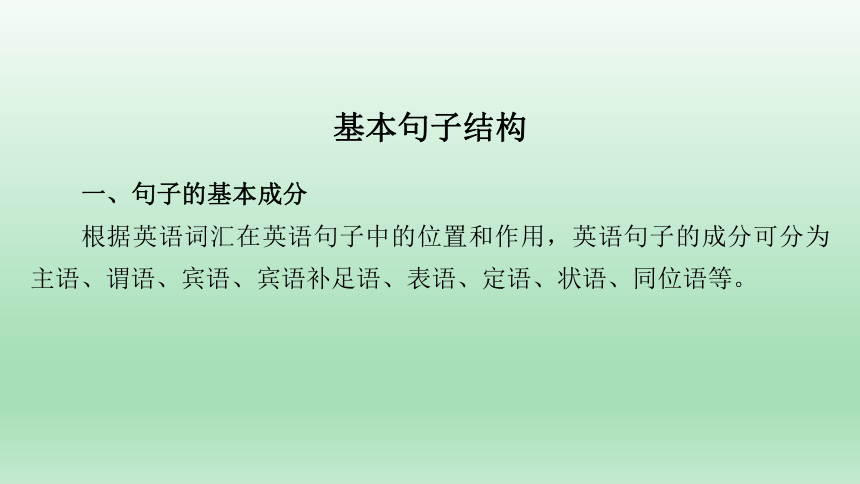
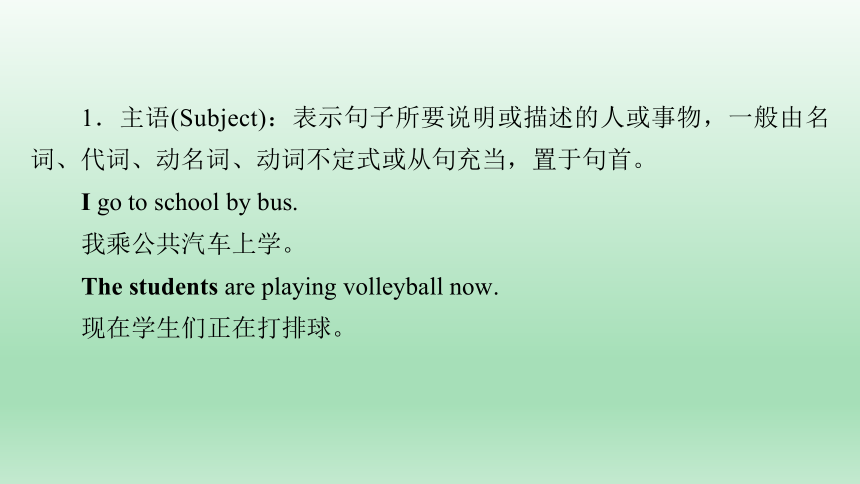
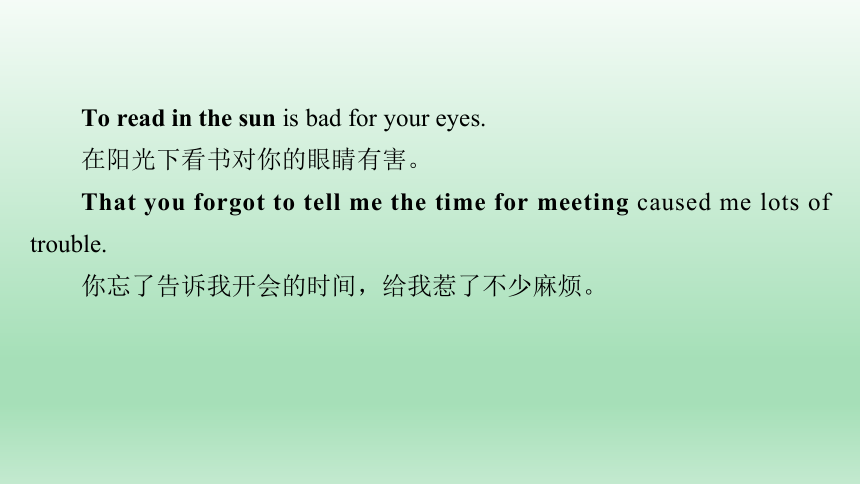
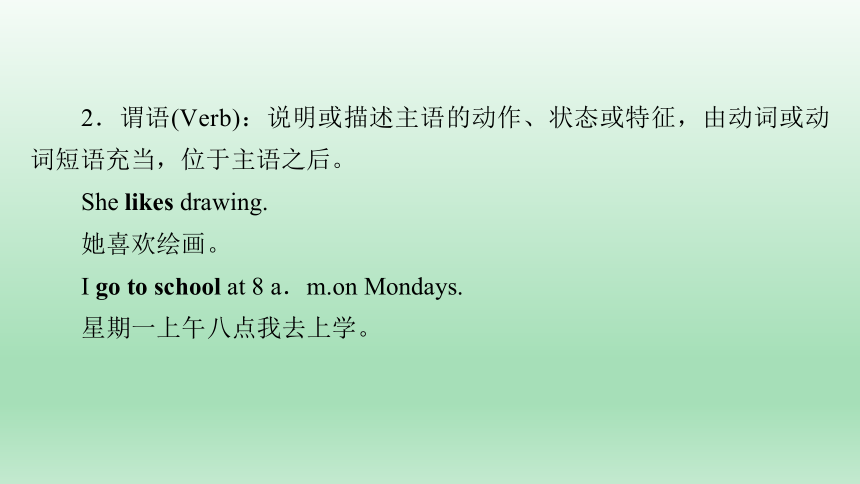
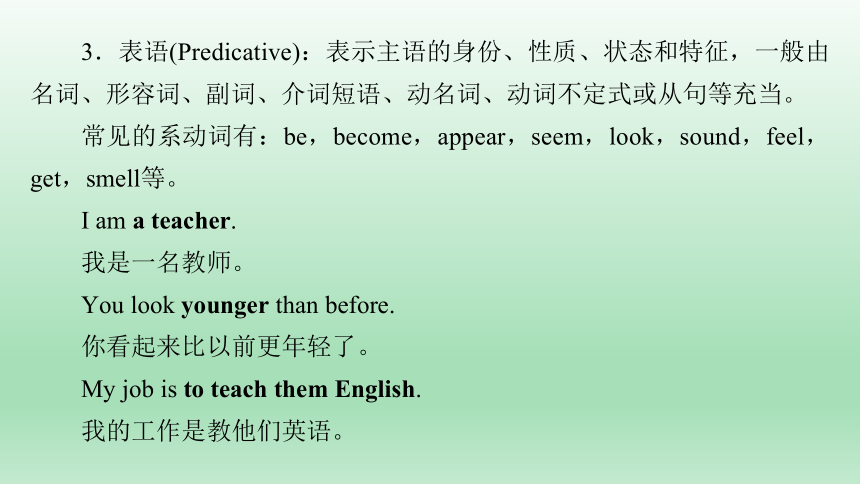
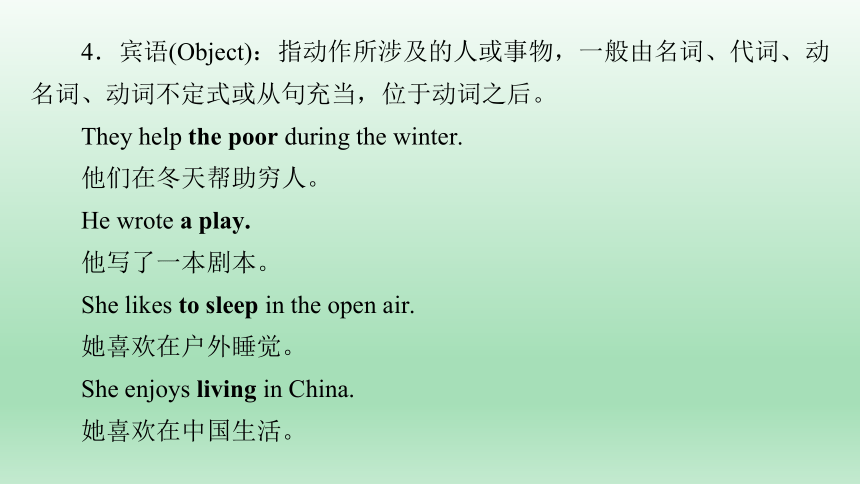
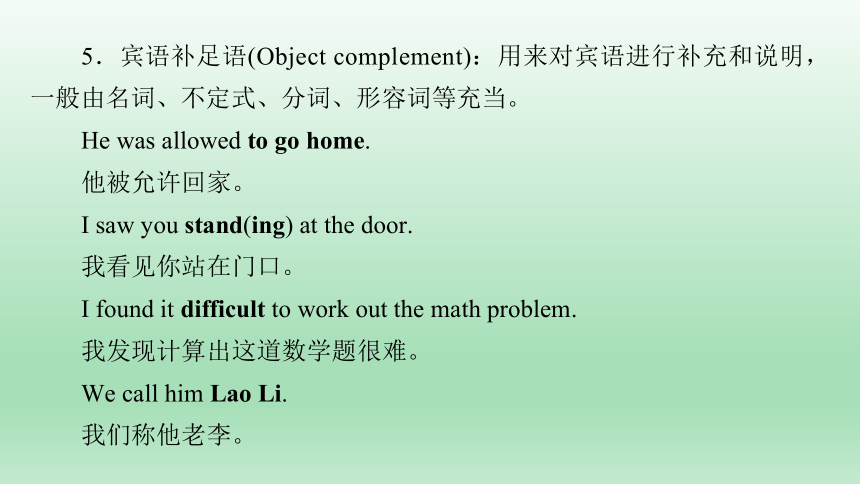
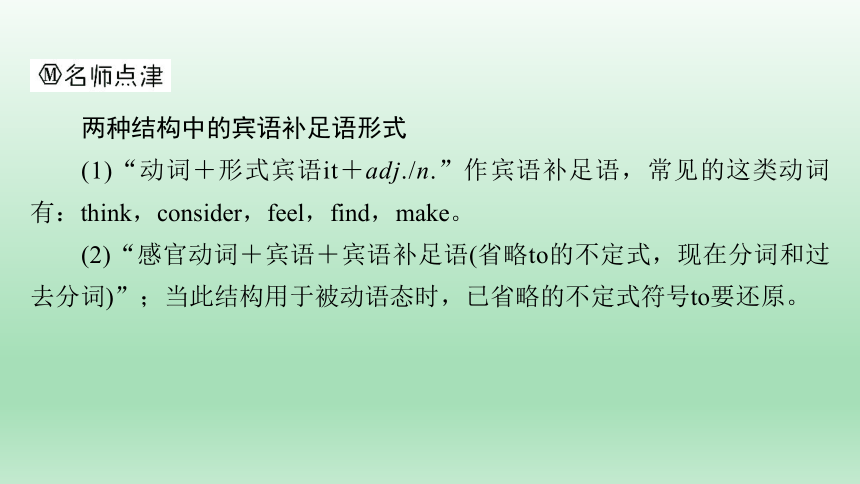
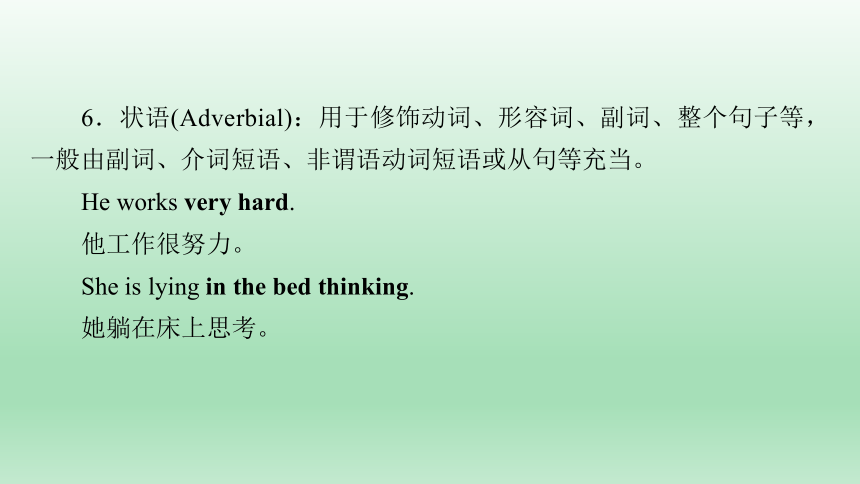
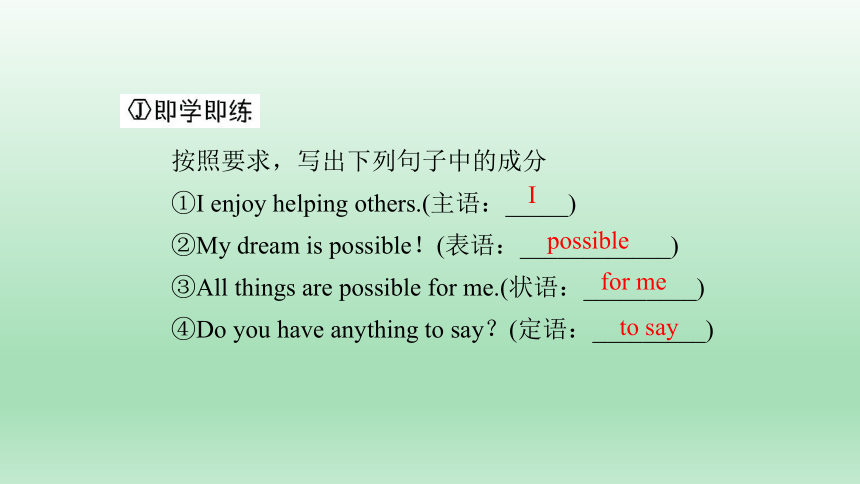
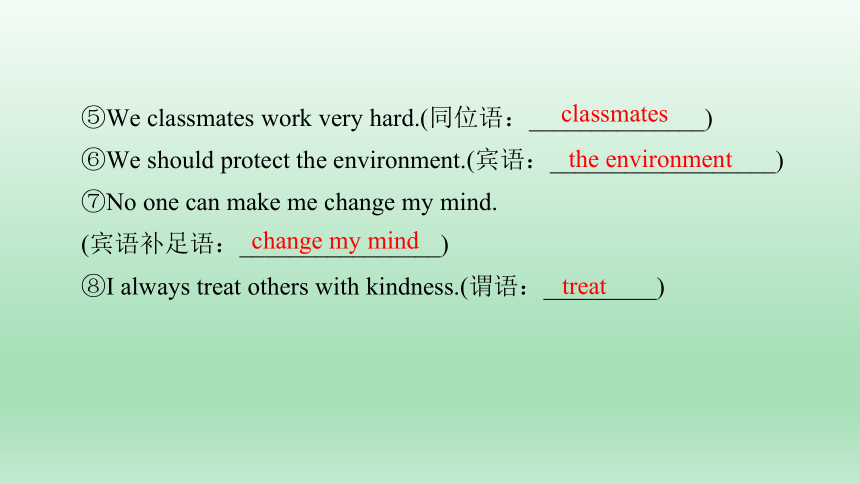
文档简介
(共32张PPT)
Welcome Unit
语法讲解
一、句子的基本成分
根据英语词汇在英语句子中的位置和作用,英语句子的成分可分为主语、谓语、宾语、宾语补足语、表语、定语、状语、同位语等。
基本句子结构
1.主语(Subject):表示句子所要说明或描述的人或事物,一般由名词、代词、动名词、动词不定式或从句充当,置于句首。
I go to school by bus.
我乘公共汽车上学。
The students are playing volleyball now.
现在学生们正在打排球。
To read in the sun is bad for your eyes.
在阳光下看书对你的眼睛有害。
That you forgot to tell me the time for meeting caused me lots of trouble.
你忘了告诉我开会的时间,给我惹了不少麻烦。
2.谓语(Verb):说明或描述主语的动作、状态或特征,由动词或动词短语充当,位于主语之后。
She likes drawing.
她喜欢绘画。
I go to school at 8 a.m.on Mondays.
星期一上午八点我去上学。
3.表语(Predicative):表示主语的身份、性质、状态和特征,一般由名词、形容词、副词、介词短语、动名词、动词不定式或从句等充当。
常见的系动词有:be,become,appear,seem,look,sound,feel,get,smell等。
I am a teacher.
我是一名教师。
You look younger than before.
你看起来比以前更年轻了。
My job is to teach them English.
我的工作是教他们英语。
4.宾语(Object):指动作所涉及的人或事物,一般由名词、代词、动名词、动词不定式或从句充当,位于动词之后。
They help the poor during the winter.
他们在冬天帮助穷人。
He wrote a play.
他写了一本剧本。
She likes to sleep in the open air.
她喜欢在户外睡觉。
She enjoys living in China.
她喜欢在中国生活。
5.宾语补足语(Object complement):用来对宾语进行补充和说明,一般由名词、不定式、分词、形容词等充当。
He was allowed to go home.
他被允许回家。
I saw you stand(ing) at the door.
我看见你站在门口。
I found it difficult to work out the math problem.
我发现计算出这道数学题很难。
We call him Lao Li.
我们称他老李。
两种结构中的宾语补足语形式
(1)“动词+形式宾语it+adj./n.”作宾语补足语,常见的这类动词有:think,consider,feel,find,make。
(2)“感官动词+宾语+宾语补足语(省略to的不定式,现在分词和过去分词)”;当此结构用于被动语态时,已省略的不定式符号to要还原。
6.状语(Adverbial):用于修饰动词、形容词、副词、整个句子等,一般由副词、介词短语、非谓语动词短语或从句等充当。
He works very hard.
他工作很努力。
She is lying in the bed thinking.
她躺在床上思考。
按照要求,写出下列句子中的成分
①I enjoy helping others.(主语:_____)
②My dream is possible!(表语:____________)
③All things are possible for me.(状语:_________)
④Do you have anything to say?(定语:_________)
I
possible
for me
to say
⑤We classmates work very hard.(同位语:______________)
⑥We should protect the environment.(宾语:__________________)
⑦No one can make me change my mind.
(宾语补足语:________________)
⑧I always treat others with kindness.(谓语:_________)
classmates
the environment
change my mind
treat
二、八种基本句型
1.SV(主语+谓语)
谓语动词为不及物动词,不跟宾语,但可以跟时间、地点、方式等状语,常见的动词(词组)有sleep,walk,swim,happen(take place),go,come,work,laugh,stay,arrive,rise,rain,run,fly等。
They laughed.
他们大笑。
2.SVO(主语+谓语+宾语)
谓语动词均为及物动词,常见的动词有like,love,want,stop,hope,help,refuse,finish,eat,have,appreciate,water,make等。
(2019·浙江高考)Some very good schools don’t have a uniform policy.
有些好的学校没有校服政策。
I enjoy working with you.
我喜欢和你一起工作。
I hope to see you again.
我希望再次见到你。
3.SP(主语+系动词+表语)
谓语动词均为系动词,常见的系动词有:be,keep,look,feel,smell,sound,taste,grow,get,go,turn,become,seem,appear等。
(2019·浙江高考)School uniforms are traditional in Britain.
在英国校服是传统的。
Tom looks thin.
汤姆看起来瘦。
The food smells delicious.
这食物闻起来很香。
4.SVIO DO(主语+谓语+间接宾语+直接宾语)
通常情况下,间接宾语(通常指人)位于直接宾语(通常指物)的前面,但有时根据需要,间接宾语位于直接宾语之后,这时要在间接宾语前加to或for。常用于该句型的动词有give,show,send,bring,read,pass,lend,leave,hand,tell,return,write,throw,make,buy,do,get,order,sing,pay等。
I gave her a present.
=I gave a present to her.
我给了她一件礼物。
I bought him a pen.
=I bought a pen for him.
我给他买了一支钢笔。
5.SVOC(主语+谓语+宾语+宾语补足语)
宾语补足语部分可以为形容词、名词、不定式、分词等形式。常用于该句型的动词(短语)有call,name,make,think,find,leave,see,watch,look at,listen to,hear,feel,let,have,get,keep,allow,need,want,ask等。其中宾语与宾语补足语统称为复合宾语。
We call him Jack.我们叫他杰克。
I found the movie interesting.
我觉得这部电影很有意思。
They asked me to help them.
他们让我帮助他们。
6.SVA(主语+谓语+状语)
(2019·全国卷Ⅰ)All the football players on the playground cheered loudly.
在操场上的所有足球选手都大声欢呼起来。
The children stayed in the room.
孩子们待在房间里。
He runs slowly in the park every day.
每天他在公园里慢跑。
7.SVOA(主语+谓语+宾语+状语)
You can put the plate here.
你能把盘子放在这儿。
He speaks English very well.
他英语说得非常好。
8.There be...(there+系动词...)
There be后面的名词是句子的主语,属倒装结构,且动词除be外,还有:lie,stand,used to be,seem to be,appear to be等。
There is a book and two cups on the table.
桌子上有一本书和两个杯子。
There are some apples in the bowl.
碗里有一些苹果。
There be句型的就近原则
There be句型中的be动词的形式应和其后紧挨着的主语一致,即“就近原则”。
句型中动词be可以为一般现在时,一般过去时,将来时和完成时。
用给出的句型翻译下列句子
①会议九点开始。(S+V)
__________________________
②他们喜欢听古典音乐。(S+V+O)
_______________________________________
③天气渐渐冷了。(S+P)
______________________________
The meeting begins at nine.
They enjoy listening to the classic music.
It is getting colder and colder.
④我下次把那本书给你带来。(S+V+IO+DO)
________________________________
⑤他听见一个女人在那边哭。(S+V+O+C)
___________________________________
⑥今年,我们这里已经有好几所私立学校了。(There be)
_______________________________________________________
I will bring you the book next time.
He heard a woman crying/cry over there.
There have been several private schools in our area this year.
专项练习
Ⅰ.标出下列各句中所包含的句子成分
1.Last week I went to the supermarket.
2.The play was very interesting.
3.I can’t hear a word.
4.They were talking loudly.
5.He has visited a great number of places in Australia.
6.She makes her mother angry.
Hopefully, these suggestions would be helpful for you⑧.I’m sure that you will have a great time⑨ and you’ll find us Chinese very friendly⑩.
Best wishes!
Yours,
Li Hua
答案:①主语+谓语+间接宾语+直接宾语
②主语+谓语+状语
③主语+谓语+状语
④主语+谓语+间接宾语+直接宾语
⑤主语+谓语+状语
⑥主语+谓语+宾语
⑦主语+谓语+宾语
⑧主语+系动词+表语
⑨主语+谓语+宾语
⑩主语+谓语+宾语+宾语补足语
Ⅲ.单句写作
1.我喜欢读书。(主+谓+宾)
________________
2.老师让我读这篇文章。(主+谓+宾语+宾补)
_____________________________________
3.我住在北京。(主+谓+状)
__________________
I like reading.
The teacher asked me to read the passage.
I live in Beijing.
4.你的建议听起来很棒。(主+系+表)
_________________________________
5.昨晚我写了一封信。(主+谓+宾+状)
__________________________
6.爸爸给我买了一辆新自行车。(主+谓+间宾+直宾)
_______________________
7.桌子上有一本书。(there be句型)
_________________________
Your suggestion sounds excellent.
I wrote a letter last night.
Dad bought me a new bike.
There is a book on the desk.
T
H
A
N
K
Thanks for listening!
Welcome Unit
语法讲解
一、句子的基本成分
根据英语词汇在英语句子中的位置和作用,英语句子的成分可分为主语、谓语、宾语、宾语补足语、表语、定语、状语、同位语等。
基本句子结构
1.主语(Subject):表示句子所要说明或描述的人或事物,一般由名词、代词、动名词、动词不定式或从句充当,置于句首。
I go to school by bus.
我乘公共汽车上学。
The students are playing volleyball now.
现在学生们正在打排球。
To read in the sun is bad for your eyes.
在阳光下看书对你的眼睛有害。
That you forgot to tell me the time for meeting caused me lots of trouble.
你忘了告诉我开会的时间,给我惹了不少麻烦。
2.谓语(Verb):说明或描述主语的动作、状态或特征,由动词或动词短语充当,位于主语之后。
She likes drawing.
她喜欢绘画。
I go to school at 8 a.m.on Mondays.
星期一上午八点我去上学。
3.表语(Predicative):表示主语的身份、性质、状态和特征,一般由名词、形容词、副词、介词短语、动名词、动词不定式或从句等充当。
常见的系动词有:be,become,appear,seem,look,sound,feel,get,smell等。
I am a teacher.
我是一名教师。
You look younger than before.
你看起来比以前更年轻了。
My job is to teach them English.
我的工作是教他们英语。
4.宾语(Object):指动作所涉及的人或事物,一般由名词、代词、动名词、动词不定式或从句充当,位于动词之后。
They help the poor during the winter.
他们在冬天帮助穷人。
He wrote a play.
他写了一本剧本。
She likes to sleep in the open air.
她喜欢在户外睡觉。
She enjoys living in China.
她喜欢在中国生活。
5.宾语补足语(Object complement):用来对宾语进行补充和说明,一般由名词、不定式、分词、形容词等充当。
He was allowed to go home.
他被允许回家。
I saw you stand(ing) at the door.
我看见你站在门口。
I found it difficult to work out the math problem.
我发现计算出这道数学题很难。
We call him Lao Li.
我们称他老李。
两种结构中的宾语补足语形式
(1)“动词+形式宾语it+adj./n.”作宾语补足语,常见的这类动词有:think,consider,feel,find,make。
(2)“感官动词+宾语+宾语补足语(省略to的不定式,现在分词和过去分词)”;当此结构用于被动语态时,已省略的不定式符号to要还原。
6.状语(Adverbial):用于修饰动词、形容词、副词、整个句子等,一般由副词、介词短语、非谓语动词短语或从句等充当。
He works very hard.
他工作很努力。
She is lying in the bed thinking.
她躺在床上思考。
按照要求,写出下列句子中的成分
①I enjoy helping others.(主语:_____)
②My dream is possible!(表语:____________)
③All things are possible for me.(状语:_________)
④Do you have anything to say?(定语:_________)
I
possible
for me
to say
⑤We classmates work very hard.(同位语:______________)
⑥We should protect the environment.(宾语:__________________)
⑦No one can make me change my mind.
(宾语补足语:________________)
⑧I always treat others with kindness.(谓语:_________)
classmates
the environment
change my mind
treat
二、八种基本句型
1.SV(主语+谓语)
谓语动词为不及物动词,不跟宾语,但可以跟时间、地点、方式等状语,常见的动词(词组)有sleep,walk,swim,happen(take place),go,come,work,laugh,stay,arrive,rise,rain,run,fly等。
They laughed.
他们大笑。
2.SVO(主语+谓语+宾语)
谓语动词均为及物动词,常见的动词有like,love,want,stop,hope,help,refuse,finish,eat,have,appreciate,water,make等。
(2019·浙江高考)Some very good schools don’t have a uniform policy.
有些好的学校没有校服政策。
I enjoy working with you.
我喜欢和你一起工作。
I hope to see you again.
我希望再次见到你。
3.SP(主语+系动词+表语)
谓语动词均为系动词,常见的系动词有:be,keep,look,feel,smell,sound,taste,grow,get,go,turn,become,seem,appear等。
(2019·浙江高考)School uniforms are traditional in Britain.
在英国校服是传统的。
Tom looks thin.
汤姆看起来瘦。
The food smells delicious.
这食物闻起来很香。
4.SVIO DO(主语+谓语+间接宾语+直接宾语)
通常情况下,间接宾语(通常指人)位于直接宾语(通常指物)的前面,但有时根据需要,间接宾语位于直接宾语之后,这时要在间接宾语前加to或for。常用于该句型的动词有give,show,send,bring,read,pass,lend,leave,hand,tell,return,write,throw,make,buy,do,get,order,sing,pay等。
I gave her a present.
=I gave a present to her.
我给了她一件礼物。
I bought him a pen.
=I bought a pen for him.
我给他买了一支钢笔。
5.SVOC(主语+谓语+宾语+宾语补足语)
宾语补足语部分可以为形容词、名词、不定式、分词等形式。常用于该句型的动词(短语)有call,name,make,think,find,leave,see,watch,look at,listen to,hear,feel,let,have,get,keep,allow,need,want,ask等。其中宾语与宾语补足语统称为复合宾语。
We call him Jack.我们叫他杰克。
I found the movie interesting.
我觉得这部电影很有意思。
They asked me to help them.
他们让我帮助他们。
6.SVA(主语+谓语+状语)
(2019·全国卷Ⅰ)All the football players on the playground cheered loudly.
在操场上的所有足球选手都大声欢呼起来。
The children stayed in the room.
孩子们待在房间里。
He runs slowly in the park every day.
每天他在公园里慢跑。
7.SVOA(主语+谓语+宾语+状语)
You can put the plate here.
你能把盘子放在这儿。
He speaks English very well.
他英语说得非常好。
8.There be...(there+系动词...)
There be后面的名词是句子的主语,属倒装结构,且动词除be外,还有:lie,stand,used to be,seem to be,appear to be等。
There is a book and two cups on the table.
桌子上有一本书和两个杯子。
There are some apples in the bowl.
碗里有一些苹果。
There be句型的就近原则
There be句型中的be动词的形式应和其后紧挨着的主语一致,即“就近原则”。
句型中动词be可以为一般现在时,一般过去时,将来时和完成时。
用给出的句型翻译下列句子
①会议九点开始。(S+V)
__________________________
②他们喜欢听古典音乐。(S+V+O)
_______________________________________
③天气渐渐冷了。(S+P)
______________________________
The meeting begins at nine.
They enjoy listening to the classic music.
It is getting colder and colder.
④我下次把那本书给你带来。(S+V+IO+DO)
________________________________
⑤他听见一个女人在那边哭。(S+V+O+C)
___________________________________
⑥今年,我们这里已经有好几所私立学校了。(There be)
_______________________________________________________
I will bring you the book next time.
He heard a woman crying/cry over there.
There have been several private schools in our area this year.
专项练习
Ⅰ.标出下列各句中所包含的句子成分
1.Last week I went to the supermarket.
2.The play was very interesting.
3.I can’t hear a word.
4.They were talking loudly.
5.He has visited a great number of places in Australia.
6.She makes her mother angry.
Hopefully, these suggestions would be helpful for you⑧.I’m sure that you will have a great time⑨ and you’ll find us Chinese very friendly⑩.
Best wishes!
Yours,
Li Hua
答案:①主语+谓语+间接宾语+直接宾语
②主语+谓语+状语
③主语+谓语+状语
④主语+谓语+间接宾语+直接宾语
⑤主语+谓语+状语
⑥主语+谓语+宾语
⑦主语+谓语+宾语
⑧主语+系动词+表语
⑨主语+谓语+宾语
⑩主语+谓语+宾语+宾语补足语
Ⅲ.单句写作
1.我喜欢读书。(主+谓+宾)
________________
2.老师让我读这篇文章。(主+谓+宾语+宾补)
_____________________________________
3.我住在北京。(主+谓+状)
__________________
I like reading.
The teacher asked me to read the passage.
I live in Beijing.
4.你的建议听起来很棒。(主+系+表)
_________________________________
5.昨晚我写了一封信。(主+谓+宾+状)
__________________________
6.爸爸给我买了一辆新自行车。(主+谓+间宾+直宾)
_______________________
7.桌子上有一本书。(there be句型)
_________________________
Your suggestion sounds excellent.
I wrote a letter last night.
Dad bought me a new bike.
There is a book on the desk.
T
H
A
N
K
Thanks for listening!
